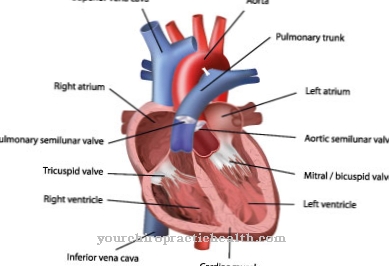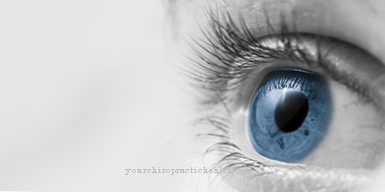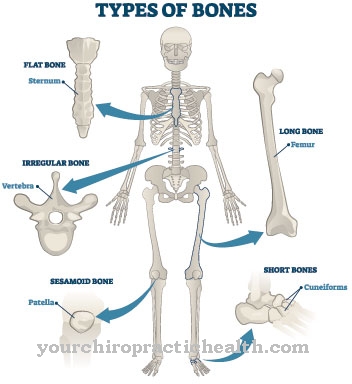The main topic Nerve disorders describes a variety of diseases that affect the nervous system or certain nerves in the body. Usually these are physical disturbances; however, psychological side effects can also occur. Nervous diseases often cannot be cured.
What are nerve diseases?

Under the collective term "nerve diseases" doctors understand numerous diseases that can be of very different nature. They either affect the vegetative nervous system and thus lead to disorders or affect the nerves of a very specific region of the body.
The physical symptoms of the disease can be as varied as the causes. They range from tingling and numbness, for example in the limbs, to paralysis or severe pain.
Mental disorders such as anxiety or panic attacks can also occur as a result of nerve disorders. Some nervous diseases are temporary and go away on their own; others, on the other hand, are difficult or impossible to treat and can also lead to the death of the patient.
causes
Nerve disorders can be caused by a wide variety of diseases and conditions. A simple wrong movement can, for example, lead to a pinched nerve, which temporarily leads to severe pain and restricted mobility.
Insufficient blood circulation, which can be attributed to external or internal causes such as narrowing of the blood vessels, causes tingling and numbness, for example in the arms or legs. The well-known carpal tunnel syndrome is a disease in which a constriction presses on the metacarpal nerve and causes pain and tingling.
Under certain circumstances, however, more serious illnesses such as multiple sclerosis, a disorder in the central nervous system, or a stroke can also be behind the symptoms. These urgently require medical treatment as they can endanger the life of the person concerned.
Typical & common diseases
- Carpal tunnel syndrome
- Amyotrophic Lateral Sclerosis
- Facial palsy
- Polyneuropathy
- Alzheimer's, Parkinson's
Symptoms, ailments & signs
The symptoms of nerve disorders largely depend on the exact nature of the disorder. For example, the carpal tunnel syndrome leads to reception disorders in the hand, while a facial paresis means facial paralysis.
Overall, however, nerve disorders express themselves through abnormal sensations and motor problems. It is particularly common for feet or hands to feel tingly. This symptom is at the beginning of many nerve diseases. The entire extremities can also be affected. Often later, there is sensitivity to touch, burning pain and a feeling of unsteadiness when walking. The feeling of swelling or constriction occurs. The extremities can feel that way too, so they aren't part of the body.
But it can also lead to numbness or abnormal sensations. The numbness can turn into complete numbness in individual parts of the body. The abnormal sensations include, for example, the baseless perception of warmth and cold as well as sudden pain stimuli or a feeling of furiness. Overall, these discomforts are very diverse.
Muscle problems do occur. This can lead to cramps, tension loss, twitching or muscle atrophy. All of these symptoms severely limit the affected person's motor skills. The other symptoms depend on the course of the underlying disease. Not all symptoms always appear.
Diagnosis & course
If a nerve disease is suspected, a doctor should be consulted to clarify the cause. In addition to a comprehensive discussion with the patient, the doctor will examine the affected body regions neurologically and test the sensitivity to pain, the sensation of pressure and temperature, as well as the muscle reflexes.
A blood test and diagnostic imaging techniques may also provide information about the cause of the symptoms. A simple pinched nerve or a lack of blood flow caused by one-sided stress or clothing that is too tight can subside by itself without treatment.
Other illnesses require medical therapy as otherwise the symptoms worsen and the quality of life of the person affected can be significantly reduced. Some diseases can even result in death for the patient.
Complications
Nerve disorders can cause many different complaints and complications. In the worst case, however, these diseases lead to paralysis or other disorders of sensitivity. The quality of life of the person affected is significantly reduced due to the nerve diseases and everyday life is restricted. In many cases, those affected are then dependent on the help of other people in their lives and can no longer do many everyday things on their own.
Nerve diseases do not always lead to a positive course of the disease. If the nerves have been irreversibly damaged, the affected person has to live with these restrictions his entire life. Furthermore, nerve disorders can also lead to psychological complaints or depression. In some cases, patients also have suicidal thoughts.
It cannot be universally predicted whether treatment for the respective disease is possible. The further course depends very much on the underlying disease itself. As a rule, there are no complications during treatment. With the help of various therapies and a healthy lifestyle, the nerve diseases can possibly be limited.
When should you go to the doctor?
Nerve diseases can arise on an emotional as well as on a physical level. A doctor should be consulted if both areas are impaired, as they each have a strong influence on the lifestyle of the person concerned. If symptoms suddenly appear, if they remain unchanged over a longer period of time or if they increase in intensity, it is advisable to consult a doctor.
In the event of numbness, impaired sensitivity or unpleasant sensations on the skin when touched, a doctor should be consulted. If functional disorders occur, everyday obligations can no longer be fulfilled or if the general load limit of the person concerned drops, it is advisable to consult a doctor. A doctor is needed if mobility is restricted, pain or pulling when moving.
If the person concerned suffers from an increased experience of stress, fear, panic or inner restlessness on an emotional level, he needs help. Concentration disorders, reduced alertness, or impaired memory function should be presented to a doctor. In the event of behavioral problems, rapid mood swings, aggressive behavior or complete withdrawal, the symptoms should be discussed with a doctor. If the discomfort spreads, it leads to a reduction in wellbeing and quality of life and if it leads to irritation, a doctor's visit is necessary.
Treatment & Therapy
If a nerve disease is found, the attending physician will initiate appropriate therapy. The type of treatment depends largely on the individual cause on which the complaints are based.
Some nervous diseases that occur as a result of mild traumatic effects do not necessarily require medical treatment. They subside by themselves with appropriate care. More serious diseases such as multiple sclerosis can be prevented from progressing rapidly by the doctor with drug therapy. In collaboration with speech therapists, physiotherapists and occupational therapists, the aim is usually to improve the patient's quality of life.
However, complete healing cannot be achieved. Carpal tunnel syndrome is treated either by temporarily immobilizing the hand or by surgery. Accompanying drug therapy with painkillers is also advisable. In the event of a stroke, you must react immediately and reduce the pressure that has developed in the brain, otherwise irreparable damage will result. If left untreated, the stroke can lead to death. If it was recognized in time, extensive rehabilitation is usually necessary afterwards.
Nerve damage can also occur in the context of diabetes. Diabetic neuropathy usually improves when the diabetes is treated and the patient's blood pressure is permanently lowered. Anxiety disorders that cause nervous deficits require psychotherapy that is tailored to individual needs and can be carried out on an outpatient or inpatient basis. This can also be supported with medication.
You can find your medication here
➔ Medicines for painOutlook & forecast
The prognosis for nervous diseases is heavily dependent on the cause of the health disorder. A pinched nerve usually temporarily causes severe pain and restricts movement. The healing prospects are very good in these cases. Often times, the pinched nerve can be loosened by appropriate compensatory movements or a sufficient supply of nerves.After a short time, you will be free of symptoms.
There is also the prospect of recovery due to a simple treatment option. The nerve will be freed from its position by a doctor in a few medical steps. Immediately after the treatment, the symptoms are significantly alleviated and, after a short time, complete healing.
If the illness is serious, the prognosis worsens. A disturbance in the central nervous system can have a chronic course. An alleviation of the existing irregularities is only possible in these patients with long-term drug therapy. Complete freedom from symptoms is usually not achieved. In addition, there is an increase in health impairments as soon as treatment is interrupted. In some cases there is an urgent need for action, otherwise life will be at risk. If there is a disturbance of the blood circulation, an untreated condition can develop into a life endangerment and thus threaten the premature death of the person concerned.
prevention
In some cases, nerve diseases can be actively prevented. Since the living conditions of the individual also have an influence on the development of different diseases, a healthy lifestyle is recommended in every case.
A balanced diet with sufficient exercise prevents obesity and diseases that may be associated with it, such as diabetes or high blood pressure. The moderate consumption of alcohol and other consumption poisons can prevent the development of sensory disturbances and other symptoms.
If numbness, tingling or pain occurs frequently, a doctor should be consulted urgently. This can find out the cause of the symptoms and rule out a serious illness or initiate suitable therapy.
Aftercare
In most cases, the measures and the options for follow-up care for nerve diseases are significantly limited or are not even available to the person concerned. For this reason, the person affected should consult a doctor at an early stage in order to prevent other symptoms or complications from occurring. No general prediction can be made about the further course of the disease, and in some cases the life expectancy of the patient is significantly restricted and reduced by the nerve diseases.
An early diagnosis, however, has a positive effect on the further course of this disease. Often the patients are dependent on the intake of different drugs. Regular consumption and the correct dosage must always be observed in order to permanently limit the symptoms.
In the event of side effects or questions, a doctor should always be consulted first. Often the help and support of one's own family with nervous diseases is also very important. This prevents or alleviates depression and other psychological upsets. In general, a healthy lifestyle with a healthy diet can also have a positive effect on the symptoms of this disease.
You can do that yourself
Numerous nerve diseases can be positively influenced by changing one's own behavior. This can mean that it can eliminate the cause of a nerve disease or reduce its impact. This can be achieved through general stabilizing effects for healthy nerves through a balanced diet and sufficient exercise.
Relaxing music at an appropriate volume is also a helpful companion. Laughing opportunities shouldn't be an exception. In individual cases, it may be appropriate to restrict or avoid luxury foods such as alcohol or tobacco. Omitting certain medications could also be an option as a behavior change. Targeted additional measures to improve everyday complaints in the case of nerve diseases depend on the individual clinical picture.
In self-help groups, a helpful exchange of information about specific recommendations for behavior in everyday life is possible. Alternating showers or saunas can reduce the tingling sensation caused by nerve disorders. If excessive stress at work is the reason for a nervous disease, the possibility of a change should not be taboo. Relaxation exercises can improve stress stability.
A hobby can also serve as a relaxing counterbalance to everyday stress. Everyday behavior that promotes sleep ensures the necessary regeneration through night sleep. A more relaxed, positive attitude towards life is also beneficial for nervous disorders. Your own daily planning should be created without deadline pressure. In order to protect yourself against excessive demands in everyday life, practical exercises help to say “no” once in a while.



.jpg)




















.jpg)



